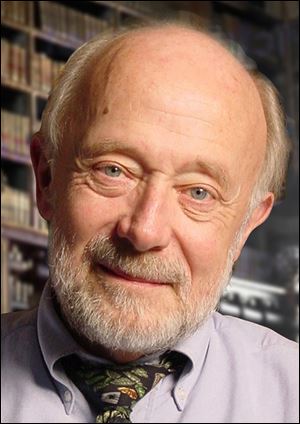
Lectures to explore creationism, evolution
Sylvania UCC to host theologian-author
1/14/2012
Theologian and author Marcus Borg of Oregon
Did God create Adam and Eve in the Garden of Eden, as the Bible says, or did humanity evolve out of primordial ooze the way Darwin theorized?
Was the universe created in seven days, or was it formed in an instantaneous Big Bang?
How does a person of faith resolve differences between theological and scientific perspectives? Are science and religion really at odds, or is that just a perception?
A lecture series addressing these and other issues of faith and science is to begin Monday at Sylvania United Church of Christ. The church's "Scientists in Congregations" series is funded by a $28,000 grant from the John Templeton Foundation. The series is to conclude with nationally known theologian and author Marcus Borg, canon at Trinity Episcopal Cathedral in Portland, Ore., lecturing Sept. 28 to 30 on historical study of the Bible.
Sheila Banerji, a molecular biologist and Sylvania UCC director of youth ministry, said the series was inspired by a Templeton Foundation grants announcement last year. "It was a no-brainer" to apply, she said. "We have a lot of scientists in our congregation, including myself, and we also have a very active science and theology book study going."
The bulk of the Templeton funds will go toward honoraria and other expenses for the speakers, with other grant money slated for publication costs, advertising, and creation of a lecture-series workbook for youths.
She said young people from seventh to 11th grade are in a formative stage of life and Sylvania UCC wants to use the lecture series to help them find solid footing at the intersection of science and religion.
"They are coming into a new perspective on their life and their faith, and a lot of them want to reject the idea of God. They are learning so much in school and they don't see how it will fit together," she said.
The first lecture is to be given Monday by Louis Stulman, a University of Findlay professor of religious studies, on "Reading Scripture: The scholarly view, modern criticisms, and how the canon came to be."
Other lectures, all set for 7 p.m. at Sylvania UCC, 7240 Erie St., will be:
Feb. 20: Faith, scriptures, big bang, stellar evolution, and the geological record, with the Rev. Julian Davies, former chemistry professor at the University of Toledo and now pastor of University Church, and Al Campaan, a UT physics professor.
March 19: Faith, scriptures, and what Darwin and DNA tell us. Speaker to be announced.
April 16: What does it mean to be a human person? What the Bible says and what modern biology and medicine tell us. Speaker to be announced.
May 21: What does it mean to be a member of human society? The Rev. Jim Bacik, pastor of Toledo's Corpus Christi University Parish.
Mr. Davies, who was a distinguished professor of chemistry at UT and an atheist before becoming a Christian and an ordained United Methodist minister, said he sees four ways that people understand the intersection of science and religion.
"One is conflict, characterized by newspaper headlines that say science versus religion, where it sounds like a boxing match and there can only be one winner. One will be destroyed and the other will move on," he said. Another view is that science and religion can never be in conflict because they are independent of each other. "Science asks how and rleigion asks why," Mr. Davies said.
A third approach is a "dialogue" where science and religion try to learn from each other.
The fourth view is "integration," with science and religion forming an integral part of a person's world view without conflicting with each other. "That's the one I hope we can all get to one day," Mr. Davies said.
Admission to the first five lectures is free. Preceding each lecture will be a "drop-in dinner" starting at 6 p.m., with a free-will offering accepted. Information on tickets for Mr. Borg's lectures will be announced later. Information: 419-882-0048.
-- David Yonke